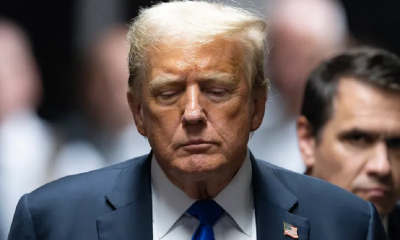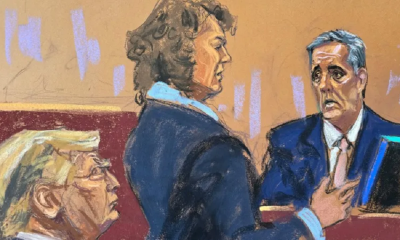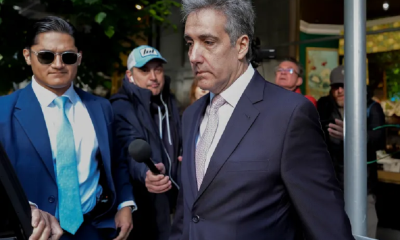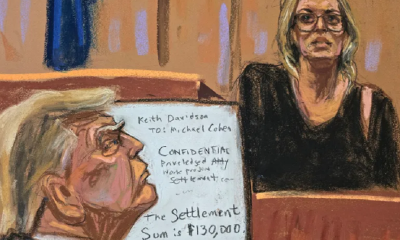Foreign News
Trump hush money trial: Michael Cohen admits to stealing
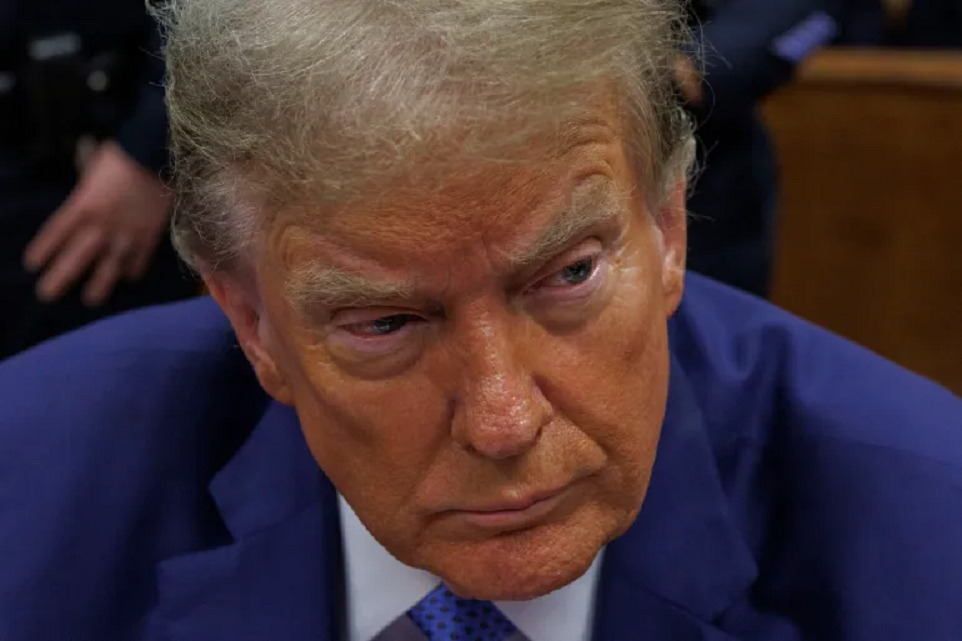
Disbarred lawyer Michael Cohen has completed his testimony before a New York criminal courtroom, as the case against his boss, former United States President Donald Trump, approaches its likely end.
Monday marked Cohen’s fourth and final day on the witness stand. His words were the last witness testimony the prosecution called before resting its case.
Now, the trial shifts towards the defence, as it seeks to rebut allegations that Trump falsified business records to conceal a hush-money payment to a former adult film actress – and thereby bolster his chances in the 2016 presidential election.
In October 2016, Cohen transferred $130,000 to the adult film actress Stormy Daniels to buy her silence about an affair she alleged she had with then-candidate Trump.
Cohen has maintained that he made the payment at Trump’s command, and that Trump then reimbursed the payment through surreptitious means, filing it under “legal expenses”.
But on Cohen’s last day on the stand, the defence sought to puncture that narrative, attacking Cohen’s credibility by drawing attention to instances where he lied and stole.
The defence has consistently maintained that Trump had nothing to do with the payment. Trump himself has denied any wrongdoing and refuted Daniels’s allegation of an affair.
Day 19 of the New York hush-money trial also marked the start of a short week. Not only is the witness list for the defence expected to be relatively brief, but the court is scheduled to break early this week, to accommodate the Memorial Day holiday in the US.
Trump faces 34 felony counts of falsifying business records in the case. Here are the takeaways from Cohen’s final day of testimony.

Former President Donald Trump told reporters outside the Manhattan Criminal Court on Monday that the prosecution has ‘no case’ (Aljazeera)
Cohen admits to stealing from Trump Organization
Before ending its cross-examination of Cohen on Monday, the defence landed a significant blow to his credibility, getting him to admit that he had stolen $30,000 from Trump’s namesake company.
Defence lawyer Todd Blanche asked Cohen outright: “You stole from the Trump Organization, right?”
Cohen offered his standard response, “Yes, sir.”
The theft came after Cohen hired the technology company Red Finch to help boost Trump’s numbers in an online poll from CNBC, ranking the best businessmen of the past half-century.
Cohen testified that Trump was “upset” that he had landed towards the bottom of the poll. By hiring Red Finch, Cohen explained that he and Trump could manipulate the poll: The tech company would cast false votes on Trump’s behalf using different IP addresses.
Red Finch was originally slated to be paid $50,000 for its services, Cohen explained. But he told the jury that he instead paid Red Finch $20,000 to “placate” its owner and then pocketed the rest, after Trump decided to reduce his holiday bonus. “I was angered because of the reduction in the bonus, and so I just felt like it was self-help,” Cohen said.
Blanche pressed the issue during his cross-examination: “Have you paid back the Trump Organization the money you stole from them?”
“No, sir,” Cohen said.
Trump’s entourage in the courtroom took the admission as a major coup for his defence.
“This just got interesting: Michael Cohen is now admitting to stealing money from our company,” Trump’s second son Eric posted on social media.
Kash Patel, an official under Trump’s administration, told reporters outside the courtroom that “we finally have a crime”. “We also have a victim,” he added. “That victim is Donald J Trump.”

Cohen reveals he made millions from media appearances
The defence has long maintained that Trump himself is not guilty of falsifying business records — but that figures like Cohen and the Trump Organization’s former chief financial officer, Allen Weisselberg, were responsible for any misdeeds.
As the defence team brought its cross-examination of Cohen to a close, it sought to paint a portrait of Cohen’s alleged greed, highlighting the ways he profited from his association with Trump.
Cohen testified that, after Trump was elected president in 2016, he made about $4m from consulting contracts, including with AT&T, a telecommunications company seeking a merger at the time.
In 2018, however, Cohen pleaded guilty to campaign finance violations and other federal crimes, including lying to Congress. He was sentenced to prison as a result.
But when he was transferred to home confinement in 2020, he took on an increasingly public role as a Trump critic. Cohen testified that, starting in 2020, he made approximately $4.4m from tell-all books and podcast appearances.
The defence also asked Cohen about a reality TV show called The Fixer he had been shopping to networks, though he said no studio has picked it up yet.

Cohen cross-examination ends, prosecution rests
In the final minutes of Cohen’s cross-examination, the defence tried to impress upon the jury that there were holes in the former lawyer’s testimony. While Cohen has maintained that the hush-money payments were falsely logged as “legal expenses”, the defence has maintained the label is accurate, as Cohen was in fact Trump’s personal lawyer.
The defence also questioned whether Cohen could accurately recollect his conversations with Trump from October 2016, the month when the hush-money payment was made.
“Notwithstanding everything you’ve said over the years, you have specific recollection of having conversations with then-candidate Donald J Trump about the Stormy Daniels matter?” Blanche, the defence lawyer, asked.
Cohen answered his usual “yes, sir”.
“No doubt in your mind?” Blanche asked again. “No doubt,” Cohen responded.
The cross-examination ended shortly thereafter, and the prosecution briefly stood to question Cohen one last time.
Prosecutor Susan Hoffinger took the opportunity to point out that Trump’s actions were on trial, not Cohen’s. “I know you might feel like you’re on trial here after cross-examination, but are you actually on trial here?” she asked Cohen.
“No, ma’am,” he replied.
The prosecution also asked Cohen to reflect upon what speaking out against Trump has cost him.
“My entire life has been turned upside down as a direct result,” Cohen responded, citing a decline in his family’s wellbeing as well as his professional prospects. “I lost my law license, my businesses, my financial security, which I was fortunately enough early to have been able to obtain.”
With that, the prosecution rested its case.

Defence calls its first witnesses, including feisty Costello
With the prosecution’s case at an end, it was time for the defence to take its turn to call witnesses.
The first was a paralegal named Daniel Sitko, who works for Blanche, the defence lawyer.
Sitko presented a chart that gave an overview of the phone calls between Cohen and Robert Costello, a lawyer who previously offered to transmit messages between Cohen and Trump.
The defence only questioned Sitko long enough to establish that Cohen’s communications with Costello were frequent, particularly in 2018 when he faced legal troubles.
Then, the defence’s second witness took the stand: Costello himself.
The decision to call Costello was not without controversy. The prosecution objected to his inclusion: Cohen has admitted to lying to Costello, and for his part, Costello has taken a prominent public role in questioning Cohen’s credibility.
Costello was also a late addition to the defence’s list of possible witnesses, and Judge Juan Merchan was forced to rule quickly about how much of Costello’s testimony he would allow.
Merchan said Costello could “offer some rebuttal” to Cohen’s testimony, but the judge added he would not allow the situation to become a “trial within a trial”.
But right away, Costello’s appearance on the witness stand was tense: The lawyer audibly reacted when the prosecution raised objections to his testimony, saying “jeez” and calling the situation “ridiculous”.
It was enough to earn a stern rebuke from Judge Merchan, who briefly cleared the courtroom to address Costello directly.
“Mr Costello, I want to discuss proper decorum in my courtroom. When there’s a witness on the stand, if you don’t like my ruling, you don’t say ‘jeez’,” Merchan said. “You don’t give me side eye, and you don’t roll your eyes.”
Costello was ultimately allowed to resume his testimony, which centred on allegations that Cohen lied about Trump’s knowledge of the hush-money payments.
“Michael Cohen said numerous times that President Trump knew nothing about those payments, that he did this on his own, and he repeated that numerous times,” Costello said.

Trump’s court entourage includes Hells Angels
The day ended with Costello’s fiery appearance on the witness stand and the prospect of further questioning from prosecutors on Tuesday.
While much of the court’s attention was focused on the final witnesses in the trial, members of Trump’s entourage also caught the media’s eye.
Seated among Trump’s inner circle was Chuck Zito, the former president of the New York chapter of the Hells Angels bikers club.
Now an actor, Zito faced his own criminal charges and served a prison sentence from 1985 to 1991.
Also in the audience were Congress members like Representative Andrew Clyde of Georgia. “What needs to happen is this particular judicial-type system needs to be defunded,” Clyde said, calling for federal funding to be cut to Manhattan’s courts.
Trump himself spoke to the press outside of the courtroom, revisiting familiar themes that the prosecution was politically motivated, and complaining about the “freezing cold” setting.
“They have no case. They have no crime,” Trump said, adding that the judge was “corrupt” and “interfering with an election”.
Trump is expected to face President Joe Biden, a Democrat, in November’s presidential race.
(Aljazeera)
Foreign News
Selfies and smiles: South Korea seeks ‘new phase’ in ties with China

South Korea’s President Lee Jae Myung has called for a “new phase” in ties with China as he met its leader Xi Jinping in Beijing on Monday.
Regional security and lifting Beijing’s unofficial ban on Korean pop culture is high on Lee’s agenda, as he continues his four-day trip in China. He is set to meet China’s Premier Li Qiang and the chairman of parliament, Zhao Leji on Tuesday.
It marks the first visit by a South Korean leader since 2019. Bilateral ties had soured under Lee’s predecessor, impeached ex-president Yoon Suk Yeol, who was very critical of China.
Xi, meanwhile, has appeared keen to shore up ties with South Korea amid a diplomatic row between China and Japan.
South Korea is a US security ally – like Japan – but also relies on China for trade. Experts say Lee is expected to keep walking a diplomatic tightrope between Beijing and Tokyo.
The visit marks the second time the two leaders have met since November when Xi visited South Korea for a regional economic summit.
On Monday Lee stated that the visit was “a crucial opportunity” for the “full-scale restoration of South Korea-China relations”, reported South Korean newspaper Chosun. “We want to usher in a new phase in the development of South Korea-China relations.”
Government officials and companies from both countries signed a series of cooperation agreements on technology, trade and environment.
Lee also took selfies with Xi, using a Xiaomi phone that the Chinese president had gifted him last year.
“The image quality is certainly good, right?” Lee posted on X along with the photos.
Xi noted that the “international situation is becoming more turbulent and complex”.
The meeting followed the US’s capture of Venezuelan president Nicolas Maduro over the weekend.
Xi urged Lee to “firmly stand on the right side of history and make correct strategic choices”, China’s official Xinhua news agency reported.
He also brought up the two countries’ shared history of resisting Japan militarism, saying that China and South Korea should now “work hand in hand to safeguard the outcomes of the victory of World War Two and uphold peace and stability in Northeast Asia”.
Xi’s eagerness to meet Lee signals the pressure he faces in finding a regional ally, Park Seung-chan, professor of China studies at Yongin University told the BBC.
“China may beat around the bush but its demand is clear: side with China and denounce Japan.”
During his four-day trip to China, Lee is expected to hold a memorial service in Shanghai for activists who fought for Korea’s independence from Japan.
But while South Korea is “still showing all its deference towards China”, it wants to “strengthen its relationships with both Japan and China”, Mr Park said.
Lee is reportedly planning to visit Japan later this month to meet Prime Minister Sanae Takaichi.
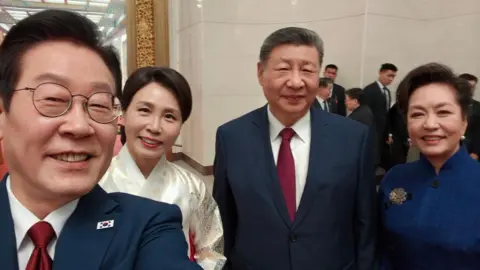
Security on the Korean Peninsula has also been part of the discussions. Lee has sought to engage North Korea diplomatically, but there has been little progress so far. He needs Chinese cooperation in pressuring the North’s Kim Jong Un to give up his nuclear weapons. Beijing is one of Pyongyang’s biggest supporters, economically and diplomatically.
Lee vowed on Monday to work with China on “viable alternatives for peace on the Korean Peninsula”.
On Sunday Seoul’s military said Pyongyang fired ballistic missiles off its east coast. And on Monday the North’s state news agency said the country test-fired hypersonic missiles to assess deterrence capabilities following recent developments, in an apparent reference to the US’s seizure of Maduro.
It remains unclear how much Lee will be able to push China on North Korea. In September, Xi had pledged to strengthen Beijing’s “traditional friendship” with Pyongyang.
And Seoul and Beijing are not natural allies.
US troops have been stationed in South Korea for decades in case of an attack from the North, and last year the two sides agreed to cooperate on building nuclear-powered submarines. The announcement drew warnings from China.
Lee has also sought to put a stop to China’s build-up of maritime structures in waters between the two countries. Beijing says the structures are fish-farming equipment, but they have sparked security concerns in Seoul.
The two leaders agreed on Monday to continue “constructive” dialogue on the matter, South Korea’s presidential spokesperson said.
Another item high on Lee’s agenda is China’s unofficial restrictions on South Korean music and dramas that have been in place for a decade. K-pop and K-dramas are either unavailable or difficult to access on Chinese media platforms.
While China has never acknowledged a ban on Korean artists, it’s believed to be a protest against South Korea’s decision to deploy a US anti-missile system in 2016, which China sees as a threat to its military operations in the region.
China is a massive market for Korean entertainment, which is already a huge global success.
At a Korea-China business forum on Sunday, Lee encouraged deeper bilateral collaboration in beauty products, food and cultural content including movies and music.
A South Korean presidential spokesperson said on Monday that the two leaders agreed to discuss the gradual expansion of cultural exchanges – without specifying concrete commitments on K-dramas or K-pop.
A Chinese foreign ministry spokesperson similarly told reporters on Tuesday that both sides have agreed to “carry out orderly, healthy, and beneficial cultural exchanges”.
Speaking before Korean residents in Beijing on Sunday, Lee said his visit would “serve as a new starting point to fill in the gaps in Korea-China relations, restore them to normal and upgrade them to a new level”.
Foreign News
Cuba says 32 Cuban fighters killed in US raids on Venezuela

Cuba has announced the death of 32 of its citizens during the United States military operation to abduct and detain Venezuelan President Nicolas Maduro and his wife in Caracas.
Havana said on Sunday that there would be two days of mourning on January 5 and 6 in honour of those killed and that funeral arrangements would be announced.
The state-run Prensa Latina agency said the Cuban “fighters” were killed while “carrying out missions” on behalf of the country’s military, at the request of the Venezuelan government.
The agency said the slain Cubans “fell in direct combat against the attackers or as a result of the bombing of the facilities” after offering “fierce resistance”.
Cuba is a close ally of Venezuela’s government, and has sent military and police forces to assist in operations in the Latin American country for years.
Maduro and his wife have been flown to New York following the US operation to face prosecution on drug-related charges. The 63-year-old Venezuelan leader is due to appear in court on Monday.
He has previously denied criminal involvement.
[Aljazeera]
Foreign News
Venezuela’s abducted leader, Nicolas Maduro, and wife appear in NYC court

Venezuelan President Nicholas Maduro, recently abducted with his wife by US special forces from his home, has appeared in a federal courtroom in New York City for a hearing on alleged ‘narcoterrorism’ and other charges.
Maduro and his wife, Cilia Flores, were brought before US District Judge Alvin K Hellerstein at 12pm (17:00 GMT) on Monday for a brief legal proceeding that kicks off a long legal battle over whether they can face trial in the United States.
Handcuffed and wearing blue jail uniforms, Maduro and his wife were led into the court by officers, and both put on headsets to hear the English-language proceeding as it was translated into Spanish.
Maduro pleaded not guilty, telling the judge, “I was kidnapped. I am innocent and a decent man, the president of my country.”
Across the street from the court, the police separated a small but growing group of protesters from about a dozen pro-intervention demonstrators, including one man who pulled a Venezuelan flag away from those protesting the US abduction.
The left-wing leader, his wife, son and three others could face life in prison if convicted of working with drug cartels to facilitate the shipment of thousands of tonnes of cocaine into the country. Some observers say there is no evidence linking Maduro to cartels.
Maduro’s lawyers said they will contest the legality of his arrest, arguing he is immune from prosecution as a sovereign head of a foreign state, though he is not recognised as Venezuela’s legitimate leader by the US and other nations.
Flores also pleaded not guilty to US charges against her during the arraignment. Hellerstein ordered the Venezuelan leader to appear in court for a hearing on March 17.

Near the end of the hearing, Maduro’s lawyer, Barry J Pollack, said his client “is head of a sovereign state and entitled to the privilege” that the status ensures.
Pollack said there were “questions about the legality of his military abduction”, and there will be “voluminous” pretrial filings to address those legal challenges.
Earlier, images showed the pair being led handcuffed and under heavy guard from a helicopter en route from a detention facility to the court, two days after they were forcibly removed from Caracas in a brazen US special forces operation.
At an emergency session of the United Nations Security Council earlier on Monday, Secretary-General Antonio Guterres expressed concern that Washington’s capture of Maduro violated international law.
“I remain deeply concerned that rules of international law have not been respected with regard to the 3 January military action. The Charter enshrines the prohibition of the threat or use of force against the territorial integrity or political independence of any state,” Guterres said, referring to the UN’s founding document.
“The maintenance of international peace and security depends on the continued commitment of all member states to adhere to all the provisions of the Charter.”
Samuel Moncada, Venezuela’s ambassador to the UN, accused the US of carrying out an illegal armed attack against his country.
Venezuela was subjected to bombing, destruction of civilian infrastructure, the loss of civilian and military lives, and the “kidnapping” of Maduro and his wife, Moncada said.
The abduction of a sitting head of state breached a core norm of international law, the personal immunity of leaders in office, he added, warning that such actions set a dangerous precedent for all countries.
Russia and China, Venezuela’s most powerful allies, strongly condemned Maduro’s abduction and called for his release.
US allies France and Colombia also notably voiced concern, saying Washington’s military operation had undermined international law.
The US ambassador to the UN, Mike Waltz, defended Maduro’s abduction, describing it as a “law enforcement operation”.
“The United States arrested a narcotrafficker who is now going to stand trial in the United States,” Waltz said.
Waltz accused Maduro of being “responsible for attacks against the people of the United States, for destabilising the Western Hemisphere, and illegitimately repressing the people of Venezuela”.
All eyes are on Venezuela’s response to the swiftly moving events after US President Donald Trump said late on Sunday that the US is “in charge” of the South American nation, which has the world’s largest oil reserves.
Vice President Delcy Rodriguez, meanwhile, was officially sworn in as interim president on Monday.
Rodriguez, a 56-year-old labour lawyer known for close connections to the private sector and her devotion to the governing party, was sworn in by her brother, Jorge, who is the head of the National Assembly legislature.
Delcy Rodriguez initially took a defiant stand against the seizure of the president, in what some observers labelled a return to “US gunboat diplomacy”. But she has now offered to colaborate with Washington.
One analyst said that Venezuela’s opposition appreciates the US intervention to remove Maduro from power, but is alarmed by Trump’s comments about US plans to “run” Venezuela, apparently with members of his government.
“Trump doesn’t recognise the decision of the Venezuelan people. We are not a colony of the US. We are an independent country,” Jose Manuel Puente, a professor at the Instituto de Estudios Superiores de Administracion, a private university in Caracas, told Al Jazeera.
“We want to initiate a transition to democracy, to rebuild the institutions, to rebuild the economy, to rebuild the oil sector. And we don’t see that from Trump until now.”
Venezuela’s National Assembly opened on Monday with lawmakers chanting “Let’s go, Nico!” as they denounced his abduction.
“The president of the United States, Mr Trump, claims to be the prosecutor, the judge, and the policeman of the world,” senior lawmaker Fernando Soto Rojas told the assembly. “We say, you will not succeed, and we will ultimately deploy all our solidarity so that our legitimate president, Nicolas Maduro, returns victorious to Miraflores”, the presidential palace, he added.
Rodriguez has served as Maduro’s vice president since 2018, overseeing much of Venezuela’s oil dependent economy and its feared intelligence service, and was next in the presidential line of succession.
She is part of a band of senior officials in Maduro’s administration who now appear to control Venezuela, even as Trump and other US officials say they will pressure the government to fall in line with their vision for the oil-rich nation.
On Sunday, some 2,000 Maduro supporters, including rifle-wielding men on motorcycles, rallied in Caracas with crowds shouting and waving Venezuelan flags. The Venezuelan military, loyal to Maduro, announced it recognised Rodriguez and urged calm.
The White House indicated on Sunday that it does not want regime change, only Maduro’s removal and a pliant new government that will enable US companies to exploit the country’s oil reserves, even if the government is filled with his former associates.
[Aljazeera]
-

 News23 hours ago
News23 hours agoBroad support emerges for Faiszer’s sweeping proposals on long- delayed divorce and personal law reforms
-

 News2 days ago
News2 days agoPrivate airline crew member nabbed with contraband gold
-

 News23 hours ago
News23 hours agoInterception of SL fishing craft by Seychelles: Trawler owners demand international investigation
-

 News4 days ago
News4 days agoHealth Minister sends letter of demand for one billion rupees in damages
-

 Opinion6 days ago
Opinion6 days agoRemembering Douglas Devananda on New Year’s Day 2026
-

 Features2 days ago
Features2 days agoPharmaceuticals, deaths, and work ethics
-

 News7 days ago
News7 days agoLeading the Nation’s Connectivity Recovery Amid Unprecedented Challenges
-
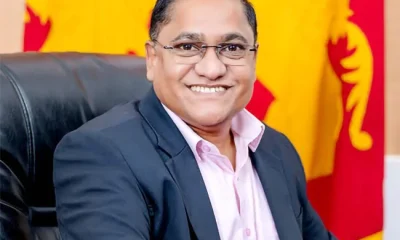
 News23 hours ago
News23 hours agoUS raid on Venezuela violation of UN Charter and intl. law: Govt.


